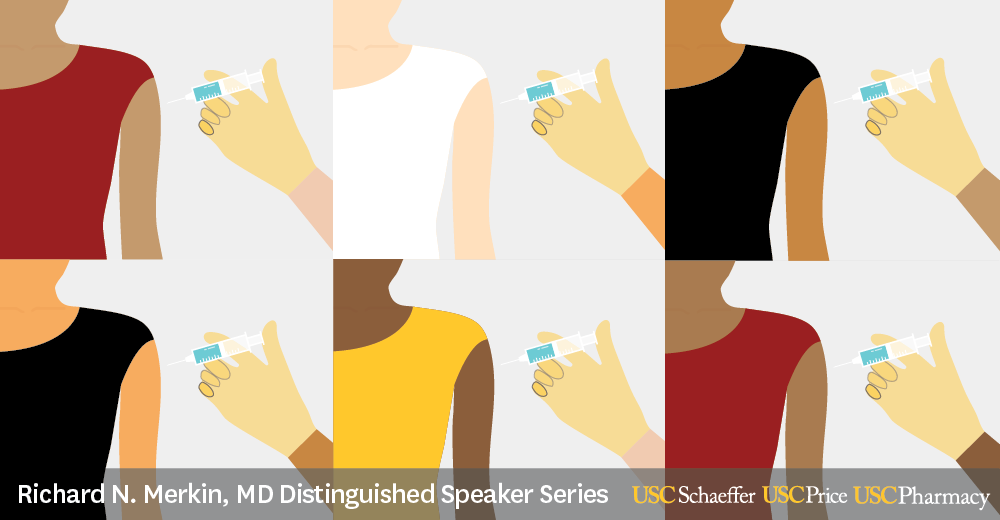COVID-19 vaccine distribution could be improved by better reliance on community organizations and pharmacies, and by rewarding those entities that do the job better, according to an expert panel convened for a Richard N. Merkin, MD Distinguished Speaker Series webinar. But the panelists sharply disagreed on whether accelerating the number of people vaccinated by delaying the second dose was appropriate, and on the merits of opening the economy and schools faster.
The event was hosted by USC’s Schaeffer Center for Health Policy & Economics, Price School of Public Policy, and School of Pharmacy and moderated by Dana Goldman, director of the USC Schaeffer Center and interim dean of the Price School.
USC School of Pharmacy Dean Vassilios Papadopoulos said vaccination should be seen as “a global problem with local distribution issues.” He noted that some states have done better than others by utilizing community pharmacies. The 66,000 pharmacies in the U.S. are the key to distribution, and will also help with vaccine hesitancy, he said. The real challenge is in getting minority and rural areas vaccinated.
“We need incentives” to reward better performance in distribution, Neeraj Sood, director of the COVID Initiative at the USC Schaeffer Center, added. “We need to work with the private sector” and make the distribution less dependent on centralized control.
Sood also advocated for postponing second doses of the Pfizer and Moderna vaccines to free up additional supplies and appointments. He noted that the United Kingdom is using that strategy to battle infections. It could help push us much faster toward herd immunity, he said.
“Nothing in the science says a second doses must come at the 21st day,” said Sood, who is also a professor and vice dean for research and faculty affairs at the Price School of Public Policy. “It should have the same effect at 42 days.”
Leana Wen argued that the U.K. could switch strategies because “people trust the National Health Service.” Such acceptance is not the case in the U.S., where distrust of doctors and science is a major problem. Over time, the limitation in battling COVID-19 is not vaccine supply, but vaccine acceptance, she said. If anecdotal reports spread of some people getting infected after taking only one dose, that is a problem. “Anything we do to erode trust is a problem for later.” Wen is an emergency physician and former health commissioner for the city of Baltimore. She is also a contributing columnist at The Washington Post and an on-air commentor on CNN.
Papadopoulos agreed with Wen.
“I would not change the FDA recommendations,” he said. “We should have complete confidence in the FDA recommendations.”
Given the decline in infection, hospitalization and death rates, combined with vaccinations approaching 2 million a day, Goldman asked if it is time to open up the economy.
Sood said yes, based on projections of how many people have already had the disease and developed some immunity. “Some seroprevalance studies say 30% to 50% of the population might have had COVID,” he said. “We are approaching herd immunity. Stay-at-home orders reduced Covid spread but the evidence is not there yet on deaths. We need to recognize that shutting down the economy affects health generally,” he added.
Wen said she is not convinced that we have herd immunity in sight. “We may have 8 percent fully vaccinated and maybe a total of 33 percent with immunity, which is a long way from the 70-80 percent level we need.” Communities need to look at their own numbers, but generally speaking “now is not the time to loosen,” she said.
On schools re-opening, the panel again discussed and debated the conversation frequently heard across the country.
Wen said that if the debate is over safety in schools, “[the country] will never agree.” She urged caution until the fall, when vaccinations for students and teachers should be at the level to make re-openings happen.
Sood argued that schools should start reopening now. He conceded that the COVID danger has not been eliminated, but noted that the danger of continuing to isolate students is profound.
What happens if we open and five kids get seriously sick, Papadopoulos posited. Do we reclose? Opening and then reclosing could be worse. “All our efforts should go to getting 70% of the population vaccinated by August,” argued Papadopoulos. A number that is achievable given current vaccination rates.
“We are in a laboratory with all the different state policies,” concluded Goldman. From distribution to re-opening schools and the economy, we don’t really know the right answer right now. “But we will hopefully learn from this as we go forward.”
